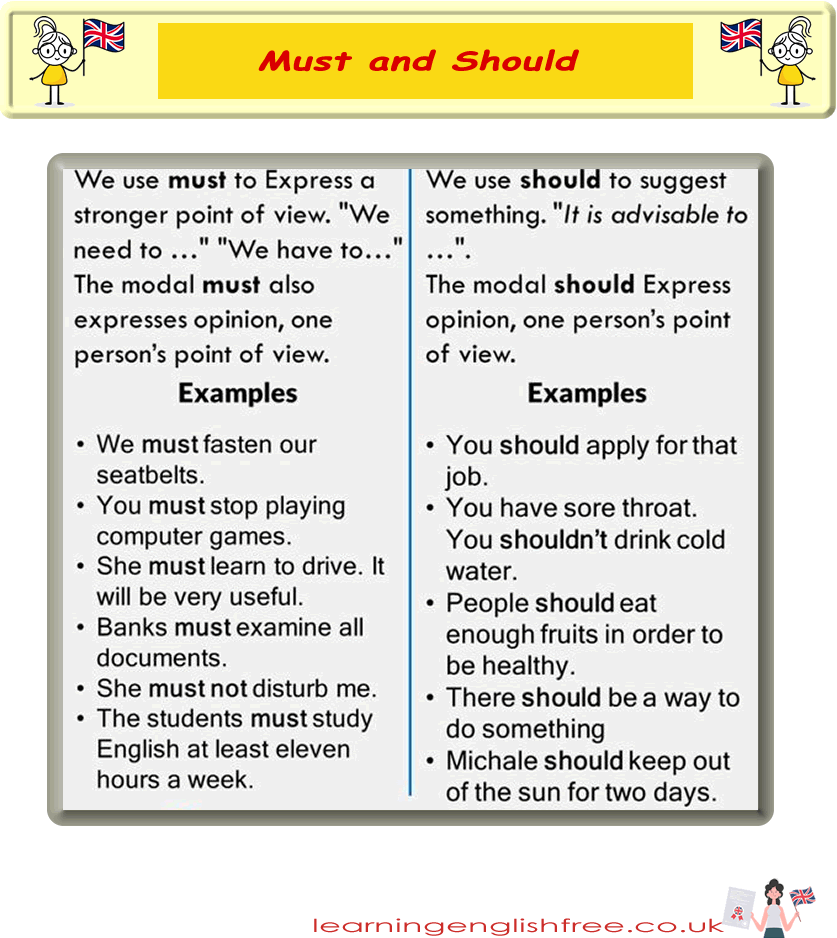
Mastering "Must" and "Should" in English Grammar
Understanding the Power of Modal Verbs
In the realm of English grammar, modal verbs such as "must" and "should" play a pivotal role in expressing necessity and advice. This lesson is designed to unfold the intricacies of these two powerful modal verbs, guiding ESL learners through their usage, meanings, and practical applications. By the end of this guide, you'll not only grasp the differences between "must" and "should" but also employ them with confidence in your daily communication, enriching your English proficiency.
Useful Vocabulary for Must and Should
Before we delve deeper into our lesson, let's familiarize ourselves with some essential terms related to our topic today. Understanding these basics will pave the way for a smoother learning journey as we explore the nuanced world of modal verbs.
Guidelines for Content Development
This lesson adheres to British English norms and is articulated in beginner-friendly language. The content is structured to facilitate easy reading and comprehension.
The Modal Verbs of Obligation and Advice
-
Must
- Meaning: Indicates a strong obligation or a necessity from the speaker's point of view.
- Example: We must fasten our seatbelts. (It's necessary for safety.)
-
Should
- Meaning: Suggests advice or a recommendation, softer than a direct obligation.
- Example: You should apply for that job. (It's advisable because it suits your skills.)
Expanding Our Understanding
-
Must not
- Meaning: Expresses a strong prohibition.
- Example: She must not disturb me while I'm working. (It's important that she avoids interrupting.)
-
Shouldn't
- Meaning: Advises against something, suggesting that it's not a good idea.
- Example: You shouldn't drink cold water if you have a sore throat. (It might worsen your condition.)
-
Expressing necessity with must
- Meaning: Must can also indicate something that's very important or essential to be done.
- Example: Banks must examine all documents carefully. (It's imperative for compliance.)
-
Giving advice with should for health
- Meaning: Should is often used to give health advice or suggestions for well-being.
- Example: People should eat enough fruits to be healthy. (It's recommended for good health.)
Examples and Uses of "Must"
-
Must for Health Recommendations
- Meaning: Used to give strong advice for health.
- Example: You must drink plenty of water during summer to stay hydrated.
-
Must for Professional Advice
- Meaning: Indicates a strong suggestion in a professional context.
- Example: You must update your CV to reflect your latest experiences and skills.
-
Must for Safety
- Meaning: Expresses a necessity for safety measures.
- Example: Visitors must wear helmets when entering the construction site.
-
Must for Environmental Care
- Meaning: Stresses actions necessary to protect the environment.
- Example: We must recycle more to reduce waste.
-
Must for Personal Development
- Meaning: Suggests actions essential for personal growth.
- Example: You must take time for self-reflection to understand your true desires.
-
Must Not for Prohibition
- Meaning: Indicates something that is strictly not allowed.
- Example: You must not enter this area without authorization.
-
Must for Academic Success
- Meaning: Highlights requirements for academic achievements.
- Example: Students must complete all assignments on time to pass the course.
Examples and Uses of "Should"
-
Should for Lifestyle Changes
- Meaning: Advises on better lifestyle choices.
- Example: You should consider walking or cycling to work to improve your fitness.
-
Should for Relationship Advice
- Meaning: Suggests how to maintain or improve relationships.
- Example: You should spend more quality time with your family.
-
Should for Financial Management
- Meaning: Gives advice on managing finances.
- Example: You should start saving a part of your income for emergencies.
-
Shouldn't for Health
- Meaning: Advises against actions that could harm health.
- Example: You shouldn't skip meals; it's bad for your metabolism.
-
Should for Learning and Development
- Meaning: Recommends activities for growth and learning.
- Example: You should read more books outside your field to broaden your knowledge.
-
Should for Time Management
- Meaning: Advises on better organization of time.
- Example: You should make a to-do list to manage your tasks more efficiently.
-
Should for Public Behavior
- Meaning: Suggests appropriate behaviors in public settings.
- Example: People should speak quietly in libraries to respect others.
Practice Makes Perfect
To solidify your understanding of "must" and "should," consider creating your own sentences that reflect obligations or advice in different contexts, such as law, health, and personal preferences. Engaging with these exercises will enhance your comfort and skill in using these modal verbs effectively.
Summary and Takeaways
Navigating through the nuances of "must" and "should" in English grammar marks a significant step forward in your language learning journey. These modal verbs are not just grammatical structures but are essential tools for expressing obligation and advice with precision. Remember, "must" is used to express strong obligations or necessities, while "should" is ideal for softer suggestions or recommendations.
To keep these concepts fresh in your mind, consider incorporating visual aids like drawings or mind maps that categorize examples of "must" and "should." Sticky notes around your study area with sentences using these models can also serve as daily reminders. Most importantly, applying these verbs in real-life conversations or writing will cement your understanding and usage.
We encourage all learners to share their progress and insights on our platform. For more tips, tricks, and lessons, visit our Facebook page at www.facebook.com/learningenglishfree.co.uk. Here, you'll find a supportive community and additional resources to further your English learning adventure. Your feedback and queries are always welcome, so don't hesitate to reach out to us through our page.
